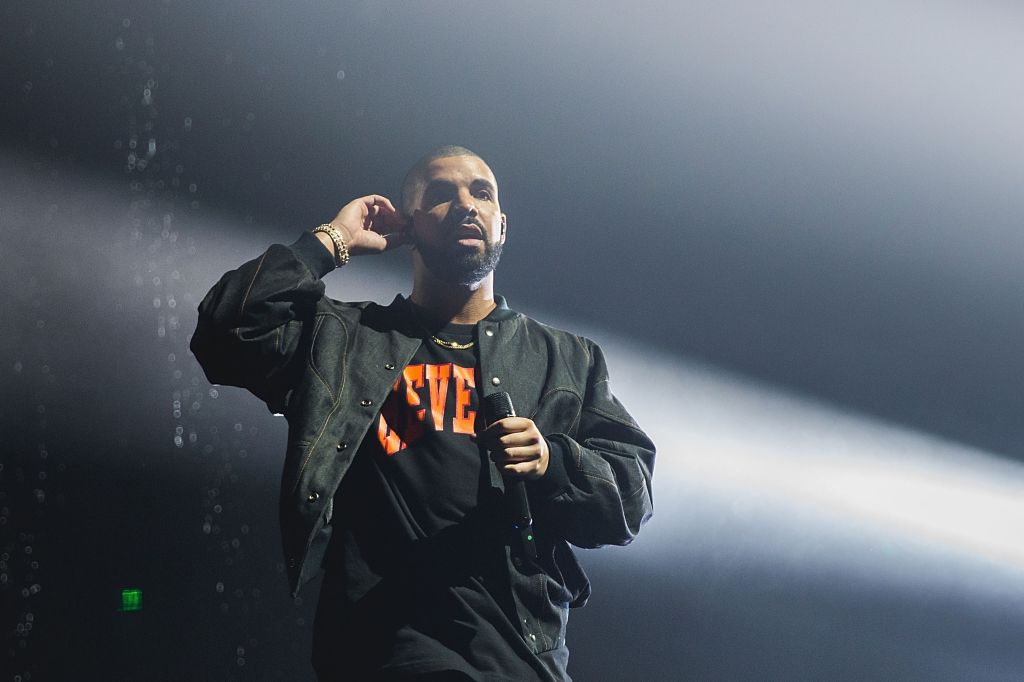
Source: Rick Kern / Getty
Drake’s Instagram has grown, like his soul, weary and brutish.
A look at his photos shows a bearded Drizzy constantly surrounded by friends in what feels like a makeshift circle of trust. It’s either that or he is alone in pictures cherry picked at odd angles from some of the iconic moments he’s had over the years. He looks lonely, his eyes sloped downward like two commas set to swing in the wind. There are a couple of reasons for this, I think. The first is his artistic stagnation. The second is his uncomfortable place in today’s pop milieu.
Scorpion, his latest effort, feels much like his past few projects: bloated and taciturn. Drake is swimming in bitterness. The indecency of having to prematurely talk about the birth of his son riled him. As did his turn as the tragic mulatto of the moment, cupping his hands to the trough of cultural transmorphism. What Pusha T spoke to—in rhymes that were as much a symbolic reckoning as an artistic one—is not that Drake isn’t real, but that Drake doesn’t know who he is at all. That Drake is unmoored: left without his Black father until he was already famous, and with a white mother whom Push thinks he’s come to rely on too much. That he has now fathered a child out of wedlock and that he was going to use that child to coincide with an adidas deal were strange disses for Push to kick up. After all, DJ Khaled has all but paraded his child around as an ambassador to his own manhood. And many an iconic rapper came from a home without a father. So what’s the big idea? Push implies Drake’s whiteness as persona should have protected him from all that.
It was a cruel turn. But, as internet purveyors know, the crueler the turn, the greater the applause. And applaud we did. So much and so loudly, in fact, that it felt as though Drake had given up. Here’s a very telling editorial note from the album:
“Yeah yeah we know.” Yet, more than at any other time in his now decade-long career, Drake now has a chance at true reinvention. He is the only great musical artist of our generation who does not adhere to the Bowie rule of stardom, which thrives on reinvention. He’s stayed the same, mostly, reveling in his penchant for acute relatability. But the wolves are at his gate now, and Drake can’t continue as the scorpion, surveying the world on spindly, pointed legs. It’s time for Drake to escape the desert of his own mind.
In Hanif Abdurraqib’s fantastic piece for Buzzfeed, he describes a Drake in stasis, locked between his paranoia and growing disdain with the success he’s cultivated. He’s right. Views flittered between talk of Italian dinners and extreme guardedness. More Life, while sunnier in most respects and quite a bit better, had hints of what one massive loss could do to him. Ironically, that snippet came on his collaboration with Kanye West: “I still have my guard up/ Blame this thing I’m part of/ Trying to avoid more confrontation, I just gotta try harder / Taking the time to clear to my mind ‘cause soon as I’m able to let go.” He hasn’t been able to let that go
But he can. Drake’s music has survived, despite some of the a-b-c rap he belts out. It has more than enough in it to blossom from this moment in his career arc. At his core, he transmogrifies his own emotions and turns them into universal sign posts, buoys to guide the way. This is the power of his particular genius. Here’s hoping he stops looking backward and places his eyes firmly on the horizon.
















